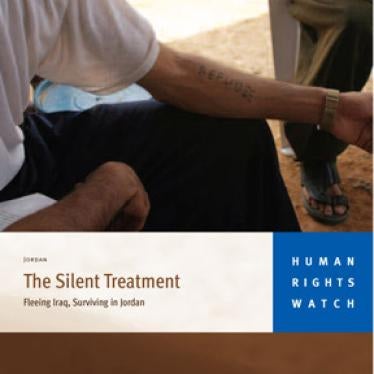After fleeing violence and persecution in Iraq, hundreds of thousands of Iraqis living in Jordan face a daily threat of arrest, fines and deportation because the Jordanian government treats them as illegal immigrants rather than refugees, Human Rights Watch said in a report released today. When US President George W. Bush meets King Abdullah in Amman tomorrow, he must offer to assist Jordan in protecting Iraqi refugees and insist Amman stops sending them back into mortal danger.
Since the war in Iraq began in 2003, more than 1 million Iraqis have fled, but none of Iraq’s neighbors, nor the United States, treats them as refugees. The 110-page report, “The Silent Treatment: Fleeing Iraq, Surviving in Jordan,” documents the hardships faced by Iraqis who have fled persecution and violence in Iraq, but who do not have permission to stay in Jordan.
“The outpouring of Iraqi refugees shows the human cost of the war to Jordan and Iraq’s other neighbors,” said Bill Frelick, refugee policy director at Human Rights Watch and author of the report. “President Bush should call on King Abdullah to protect Iraqi refugees, and the US should offer aid to the countries struggling to cope with the influx from Iraq.”
The United Nations High Commissioner on Refugees (UNHCR) has called for these countries to provide temporary protection. The Jordanian government was tolerant of more than 500,000 Iraqis living in Jordan until the November 2005 hotel bombings in Amman, when it began arresting and deporting Iraqis without legal residency status. Now Jordan is refusing many Iraqis entry at its border.
The report is based on in-depth interviews with Iraqis who have fled to Jordan because of the war. With their tourist visas long-expired, these Iraqis rightly fear they may be deported if discovered, so often do not send their children to school, and have limited access to health care. Because they do not have work permits, many are forced into exploitative or marginal employment.
A woman from Najaf told Human Rights Watch that her husband had a college degree, but could only find work in construction as an illegal day-laborer. “Oftentimes, after the work was finished, they just told him to go and did not pay him, since he couldn’t go to the police,” she said. Even though her husband carried a UNHCR document, Jordanian authorities arrested him at his job site and deported him directly to Iraq, where he has since been injured in a terrorist bombing and suffered a heart attack.
The report also details the perilous journey from Iraq to Jordan and the increasing number of rejections at the border. A few hundred Palestinians and Iranian Kurds who entered at the start of the war in 2003 remain at an isolated camp near al-Ruwaishid, but because the government now denies permission to enter, a group of Iranian Kurdish refugees are encamped in the no-man’s land between the Iraqi and Jordanian border checkpoints, and all Palestinians trying to flee Iraq are pushed back.
Although the report focuses on the plight of Iraqi refugees in Jordan, it is not meant to single out Jordan as uniquely mistreating them.
“On the contrary, Jordan and Syria have been the most tolerant in the region toward Iraqis,” said Sarah Leah Whitson, director of Human Rights Watch’s Middle East and North Africa division. “We hope this report will push the international community to share the responsibility for these refugees.”
The United States and the United Kingdom, who led the invasion of Iraq, have paid scant attention to the regional human fallout caused by their intervention. Neither country has resettled more than a relative handful of Iraqi refugees from Jordan or Syria, Human Rights Watch said.
“For the United States and the United Kingdom to recognize the existence of a million refugees would mean admitting they have failed to establish peace and security in Iraq,” said Whitson.
The report calls on the Jordanian government to take immediate steps to protect Iraqi refugees by, at the very minimum, providing temporary protection as called for by the UNHCR. It should suspend the deportation of all Iraqis who register for temporary protection, admit asylum seekers at the border pending determination of their claims, provide work authorization for temporary-protection registrants, and exempt from fines Iraqis who have overstayed their visas if they register for temporary protection. In addition, the government should honor and enforce the right of all children residing in Jordan, regardless of immigration status, to free and compulsory primary education.
“Jordan has a long history of welcoming refugees,” Frelick said. “It should not stop now. The safety of hundreds of thousands of people hangs in the balance.”







